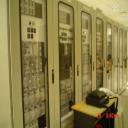Yahoo Answers is shutting down on May 4th, 2021 (Eastern Time) and beginning April 20th, 2021 (Eastern Time) the Yahoo Answers website will be in read-only mode. There will be no changes to other Yahoo properties or services, or your Yahoo account. You can find more information about the Yahoo Answers shutdown and how to download your data on this help page.
Trending News
Which is the more efficient electrical service, 120V, 60 Htz, or 240V, 50 Htz?
Provide reasons for your response, please.
6 Answers
- Rich ZLv 71 decade agoFavorite Answer
As far as getting by with skinnier wires and reducing the capital cost of the electrical installation in a building the 240v is better. As far as providing safety in case of accidental contact the 120v is better. As far as minimizing the cost of transformers and motors the higher 60 cycle is better.
Both combinations are historical accidents that are now so deeply part of world infrastructure that no change is practical. Anything starting from scratch (like airplanes) made other choices.
So "more efficient" determination depends on your criteria that you want to minimize and maximize.
Source(s): If I could start from scratch I would suggest 240v and 400 cycles matched with dead-front outlets that show no voltage until after the plug is inserted. - 1 decade ago
As others have mentioned, the higher voltage provides the benefit of lower equipment cost at the expense of greater safety risk.
In terms of energy efficiency, probably not much difference because true lower current means lower losses, but only in the same wire. With the higher voltage (to save money) thinner wires can be used, but the thinner wires have higher resistance so in practice you come out about the same.
- 1 decade ago
Higher the voltage means lower the I2R (I square R) loses.
Countries having better infrastructure will transmit electricity at lower voltage and higher amps. But many countries where the technology of transmission is below par with developed countries, they use 220 or 240 Voltages.
On the other hand as far as the usage is concerned, higher ampere with less voltage is efficient for the end user, as the current is very robust.
So it is really depends on how a govt compromise with its policies. It means, if we feel that end user is important and having good technologies to minimize the I2R loses, go with 120V, else 220/240V.
- 1 decade ago
Doubling the voltage will be more efficient since it will reduce the I square R Losses.
But when you consider the safety operations,preferably 120 V 60 hz having more advantages.
Simple example for feeling shock in 120 V like "ant bite"
where as in 240 V like "snake bite"
but some times ant bite also will cause seviour damages, I mean 120V
- How do you think about the answers? You can sign in to vote the answer.
- 1 decade ago
both are efficient as low voltage distribution values
it just differs which country u r in, each country has its own standards and regulations
for example here in egypt, like europe: 220 V 50 Hz
but in saudi arabia, like the States: 120 V 60 Hz
- L DLv 61 decade ago
doubling the voltage of equipment means you need only one half of the current whichmean that waste heat will be (1/2)^2 which turns out to be a quarter of that produced at the lower voltage.It's not everything of course but it does mean that higher voltage equipment can be much less massive.I've no quarrel wth the idea that the lower voltage equipment is less likely to give a fatal shock!






